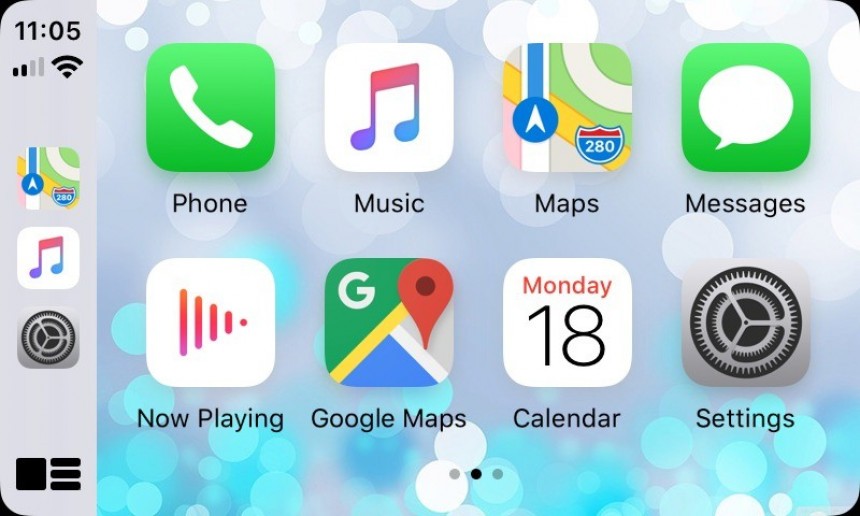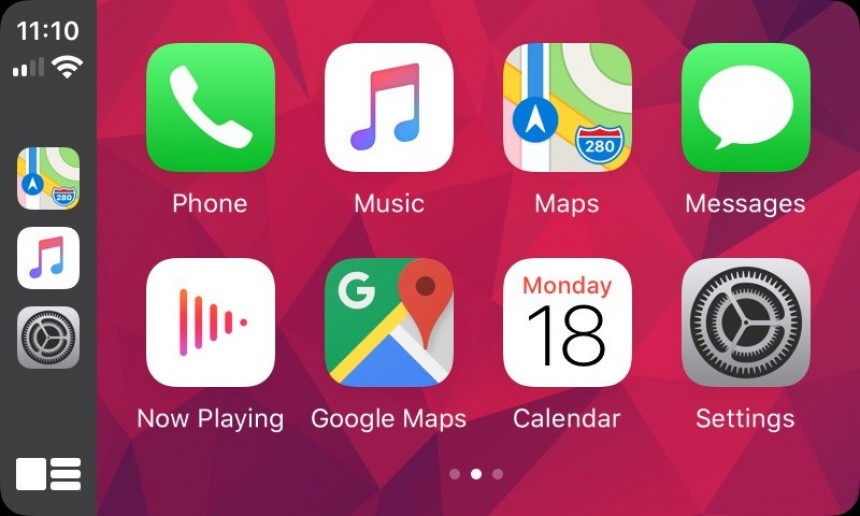Tel: 01476 855 090 Email: Sales@Rangeroverworld.co.uk
Range Rover World News
Range Rover World News
Range Rover World News
Range Rover World News
Range Rover World News
Range Rover World News

Iphone Updates cause carplay chaos
Latest iPhone Update Breaking Down CarPlay
They say keeping your devices up-to-date is the best thing you can do to prevent hacks and exploits, but in the case of iPhone owners, a CarPlay bug makes many wish they waited longer.
The most recent iOS update appears to be the culprit of major connectivity problems. Many users claim their cars no longer detect the iPhone after the installation of iOS 16.4.1, and the generic fixes in the Apple world don’t produce any improvement.
I, too, experienced the same behavior in my car, though I eventually got CarPlay up and running by starting from scratch. This isn’t the most convenient workaround, but given Apple’s walled garden, our options are very limited anyway.
If you didn’t yet update your iPhone to iOS 16.4.1 and are unsure you should do it, here’s everything you must know about the bug.
What happens after the update
iOS 16.4.1 is the latest operating system update for iPhones and comes with critical security fixes. Apple explained in the official release notes that it was already aware of exploits happening in the wild. As such, installing the update right away is strongly recommended to keep the iPhone and the data stored on it secure.
The update doesn’t bring any CarPlay changes, so in theory, it shouldn’t impact the experience in the car. And yet, it does, breaking down the connection between the iPhone and the head unit.
Broken connections aren’t very common in the CarPlay world and are more often a bad cable symptom for Android Auto users. In fact, Android Auto users have been battling connectivity problems for many years already, and more often than not, replacing the cord did the trick.
This doesn’t seem to be the workaround this time. Not in my case, at least, as I was already using a genuine Apple cable that shipped in the box of my iPhone.
If you’ve been part of the Apple world for more than a month, you probably know already that third-party cables must be certified for iPhones. The likelihood of coming across a poor-quality cable is, therefore, significantly reduced unless you buy the $1 versions you find on Chinese shopping sites.
 Photo: Packix
Photo: Packix
The workarounds
The first thing you should try if CarPlay isn’t working after the update to iOS 16.4.1 is another cable. As long as it’s Made for iPhone, it should work just like the genuine Apple cable.
As I said, the cord is unlikely to be the one to blame. While it could produce an improvement, especially if your previous cable was already broken, it’s unlikely to bring things back to normal if iOS 16.4.1 caused the connection problem.
The fix comes down to starting from scratch in your car.
In other words, you need to remove the existing CarPlay configuration and vehicle profile from your settings. This way, any possible corruption issues would be resolved by removing the errors altogether.
It’s easy to see the main shortcoming here. By resetting CarPlay and deleting your vehicle profile, you need to configure the car-optimized experience once again. This doesn’t typically take more than a couple of minutes, but even so, it’s something extra that you need to do because of a bad update.
If your CarPlay connection also created a profile on the head unit, remove that one too. This is the only way to make the two devices (the media receiver and the iPhone) forget each other completely.
 Photo: PackixI’ve seen people online claiming that resetting Siri also brings things back to normal. This is an awkward solution, but it is probably worth a try anyway. Siri must be enabled on the iPhone to run CarPlay, so when resetting the digital assistant, users also reenable CarPlay altogether.
Photo: PackixI’ve seen people online claiming that resetting Siri also brings things back to normal. This is an awkward solution, but it is probably worth a try anyway. Siri must be enabled on the iPhone to run CarPlay, so when resetting the digital assistant, users also reenable CarPlay altogether.
As a result, turning off Siri also disables CarPlay, eventually removing the potential corruption errors I talked about earlier.
As with everything else in the Apple world, the company has remained completely tight-lipped on what happens on CarPlay after the latest update’s release. Fortunately, the connectivity problems are not widespread, and a full reset of CarPlay is the universal fix that works for everybody.
Some users on reddit claim that iOS 14.5 fixes the issue. Currently in the beta stage, iOS 14.5 is the next big update planned for iPhones, and it is due next month. If this is indeed the case, then Apple is aware of the CarPlay problems and has already developed a fix. Oddly enough, the company is holding back this patch until the next major update. In the meantime, users are pretty much alone in their struggle to fix CarPlay.
As a general recommendation, you should also make sure the head unit is already on the latest firmware version. This way, the likelihood of compatibility issues is significantly reduced. A fully up-to-date head unit with an iPhone running 14.5.1 and a clean CarPlay configuration should ensure a smooth experience for the majority of drivers.

"Range Rover World Unveils Critical Findings
Urgent Oil Dilution Alert for SDV6 and SDV8 Engines
Today, we bring to your attention a critical issue affecting all Range Rovers, particularly those with Diesel Particulate Filters (DPFs).
The Core Problem: Oil Dilution in Range Rovers
Our research, in collaboration with the Oil Lab, has uncovered a significant challenge in Range Rover models, particularly those equipped with the SDV6 and SDV8 engines. The root of the issue lies in the DPF regeneration process, where additional fuel is injected during the exhaust stroke. This method, while necessary for the DPF's functionality, inadvertently allows fuel to seep past the piston rings, contaminating the engine's oil.
Startling Discovery: Viscosity Deterioration
Our intensive testing revealed alarming results. A standard SDV6 oil sample, expected to maintain a 5W30 Synthetic oil grade, degraded to a 5W15 grade after just 4,000 miles of usage. This drastic drop in viscosity compromises the oil's protective and lubricating properties, endangering the engine's internal components.
The Experiment: Seeking Solutions
In our pursuit of a remedy, we conducted an intriguing experiment. After switching the oil in SDV6 and SDV8 models to a 5W40 grade and repeating the 4,000-mile test, the oil's degradation was noticeably reduced, maintaining a 5W30 spec even after an extended 8,000-mile run. Replicating this test across multiple vehicles consistently yielded similar results.
Our Conclusion: A Vital Recommendation
The findings are clear: both the SDV6 and SDV8 engines suffer from severe oil dilution. Our forensic analysis strongly recommends transitioning to a 5W40 C1 Edge or equivalent oil for maximum engine life preservation. Additionally, this oil grade showed a significant reduction in metal particles compared to the 5W30 oil when diluted, indicating better engine protection and reduced metal-on-metal contact.
Immediate Action for Range Rover Owners
Given the prevalence of engine failures in the Land Rover community due to oil dilution, we urge owners, especially those using the standard 5W30 oil, to consider more frequent oil changes – every 6,000 miles. Alternatively, removing the DPF could provide a more permanent solution to this issue.
We understand the importance of your Range Rover's performance and reliability. As such, we are dedicated to keeping you informed and providing solutions to enhance your driving experience. For more details on our findings and recommendations, please visit our website.

In light of our recent findings on oil dilution issues in SDV6 and SDV8 engines, we at Range Rover World are taking proactive steps to assist our valued community of Range Rover enthusiasts. We strongly encourage owners to consider booking a service with our expert team to address this critical issue. Our professional service ensures your vehicle receives the attention and care it needs, with the right oil grade to maintain engine health and performance.
Alternatively, for those who prefer a hands-on approach, we offer specially curated service kits available for purchase on our website. These kits are designed to enable you to perform an oil change at home, ensuring your Range Rover operates at its best while maintaining your all important service history!
The research and findings presented by Range Rover World have been independently conducted in collaboration with the Oil Lab. While we stand firmly behind our recommendations based on the data and tests we have performed, it is important to acknowledge that our suggestions may not align with the official stance of Land Rover. As passionate Range Rover enthusiasts, we believe in sharing our knowledge and findings with the community. However, these should be considered as recommendations based on our independent research, and vehicle owners should make informed decisions regarding the maintenance of their vehicles."
Book A Service Now
Range Rover World Parts and Lubricants

Our Quality Branded OEM Equivalent products
RRW Lubricants and Parts, your one-stop destination for exceptional vehicle maintenance solutions. We specialize in providing premium-quality lubricants and parts, tailored specifically for Range Rover and Jaguar Land Rover models. Our product range includes high-performance alternatives to OEM fluids, ensuring compatibility with advanced systems like Active Roll Control (ARC) in newer platforms such as L405 and L494.

RRW COLD CLIMATE POWERSTEERING FLUID
Introducing our premium alternative to OEM steering fluids, ideal for Active Roll Control (ARC) systems in L405 and L494 models. High-quality, cost-effective solution for enhanced performance.

RRW 8-SPEED
8 Speed ZF Transmission Oil, expertly designed for optimal performance in Range Rover and Jaguar Land Rover vehicles. Meeting ZF specifications, this oil ensures smooth, efficient transmission operation. Our cost-effective solution maintains your vehicle's high standards, blending quality with affordability.
Range Rover World gets JLR approval on Lubricants
Copyright © 2026 RangeRoverWorld - All Rights Reserved.